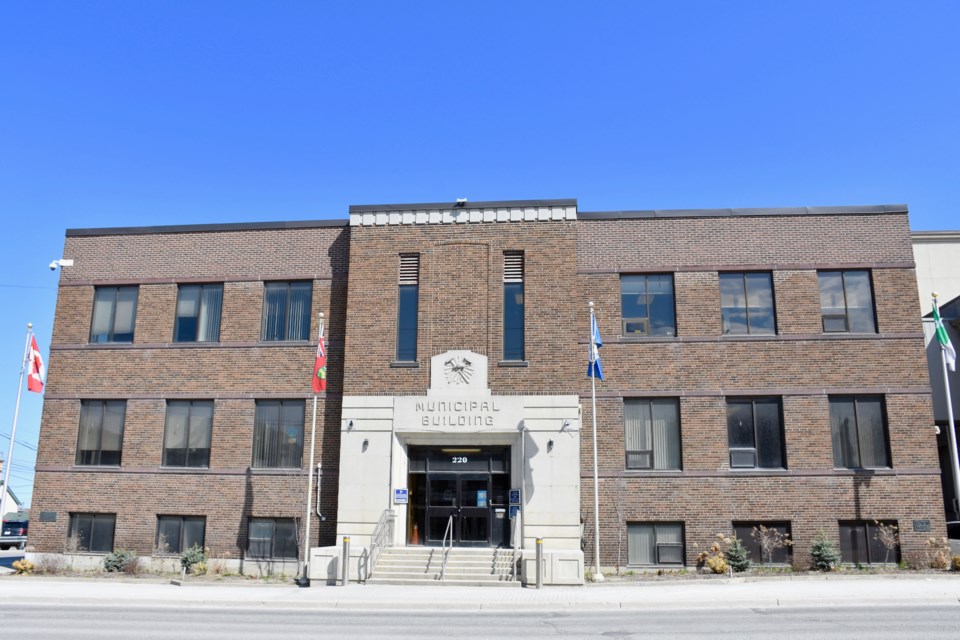The current measures the city has taken to provide local COVID-19 relief comes with a pricetag of $315,000 per month, according to Timmins Mayor George Pirie.
Tuesday, council approved the 2020 tax rates and ratios. A motion to provide further relief to residents was voted down.
Before the motion for further pandemic relief was tabled by Coun. Joe Campbell, Pirie outlined some of the measures the city has already taken.
They include waiving the interest fees, charges and penalties on property taxes, water and sewer, Municipal Accommodation Tax, and rent paid by organizations leasing city facilities. Transit fees have also been waived, and parking metres aren't being enforced. The interim measures, according to Pirie, cost about $315,000 a month.
Upper levels of government have announced relief programs for individuals and businesses. So far, Pirie noted nothing has been offered either federally or provincially to help municipalities, and the city may have to cover any shortfall from reserves.
“The city wants to be in a position to stimulate the local economy through its capital spend. The city wants to complete the revision of its CIP program, which has been active for some time to encourage investment here. We do not know yet what the hole in our revenue line will be due to an inability to pay tax. We do expect to receive a tool from PPMG later this week to help us do this," he said.
Because large employers are still operating, he hopes it will help the city recover quicker.
Campbell's motion called for staff to table a zero per cent budget increase for consideration at the next council meeting, and to reassess the previously approved 2020 rate hike for water and wastewater to either eliminate or reduce it. It also would have cancelled user fee increases indefinitely until the risk to residents is over.
It was defeated in a recorded vote. The councillors to vote in favour were Campbell, Mickey Auger and Kristin Murray.
While waiving interest is a start, Campbell said people who "can’t afford to pay these taxes now will be faced with a difficulty paying accumulated arrears at a later date."
He argued that doing a pre-review of non-essential spending in the 2020 budget would let council know what wiggle room is available to help in any recovery.
“The budget presented to us during normal times is a good budget, but these are not normal times. The one per cent will mean we will leave $730,000 in the hands of our taxpayers who assist in any kind of recovery,” he said.
Campbell said there are limits on what the municipality can financially and legally do, but that there are opportunities.
“There’s two ways we can immediately send a message to our taxpayers that we are part of the solution. Minimizing taxes and fees levied until the crisis is over, waiving interest fees on outstanding debt owing the city. We have to start somewhere and show our businesses and citizens we can be part of the solution,” he said.
Pirie said that motion should be considered at a later date, as the city should only rebudget once.
“It might involve a situation where we have to go through significant cuts and layoffs, I hope not, but I don’t want to make any first moves without knowing what else is out there,” he said.
He told council that municipal associations are recommending to resist the temptation to rebudget until it's known what the full impact will be.
Pirie said the most effective way to put money back into people's pockets is through employment.
"Hopefully at the end of this, if it ends soon enough, we’re able to execute on our capital spend and be prepared to take advantage of anything that the province has out there to execute on infrastructure projects,” he said.
The 2020 tax rates and ratios have also been approved.
Director of finance Natalie Moore's report breaks down the residential and commercial categories.
According to it, 41.98 per cent (7,130 properties) of residential properties are decreasing by an average of $38, while 49.36 per cent (8,384 properties) are increasing by an average of $41. Overall the average change in the residential class is a $20 increase.
For commercial properties, she said 58.18 per cent (562 properties) are decreasing by an average of $638, and 29.30 per cent (283 properties) are increasing by an average of $95. The total average change for commercial is a $182 decrease.
Pirie also gave a general update on what's happened in the city for the pandemic since the last meeting.
“We’re living through the most severe healthcare crisis in a century,” he said.
At the time of the meeting there were 39 confirmed COVID-19 cases in the Porcupine Health Unit's region.
Over the past couple of days there has been no new positive tests, but Pirie said it's too early to reach conclusions about any policies in place.
“This is a very important week for the City of Timmins as we work our way through the COVID-19 pandemic. The Porcupine Health Unit has increased the testing and the results this week will include the full population of Spruce Hill Lodge caregivers and staff, in short all the employees and residents,” he said.
He also noted that a significant challenge has been sourcing personal protective equipment. Having bylaw officers at essential businesses enforcing the Emergency Measures Civil Protection Act orders has also been successful. There have been no charges, and he said individuals have, for the most part, cooperated and been considerate.
At the end of the meeting, he also received feedback from council on a potential curfew. Councillors were in favour of temporarily imposing one, with most in favour of it starting at 10 p.m.



